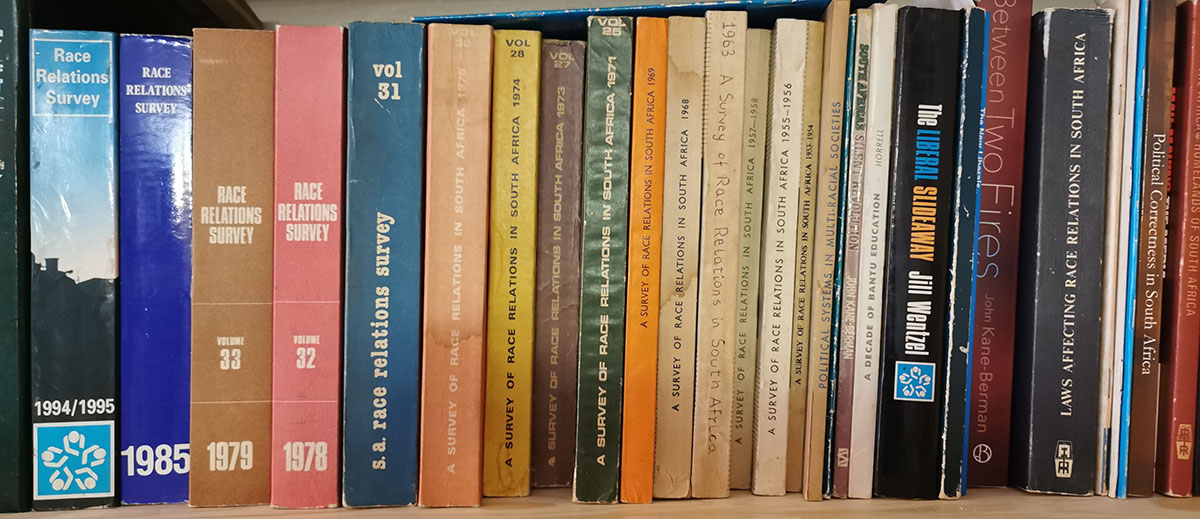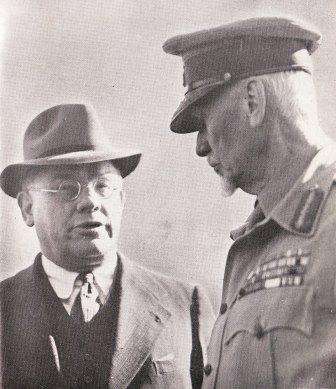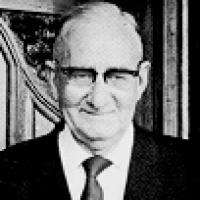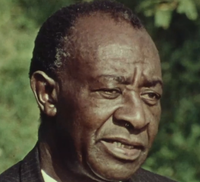The Institute of Race Relations has been in continuous operation for over nine decades and will celebrate its centenary in 2029.
Throughout these years, the IRR objectives were and remain: to work for peace, goodwill, and practical cooperation in South Africa; and to initiate, support, assist, and encourage investigations that may lead to greater knowledge and understanding of the racial groups and of the relations between individuals across and within these groups.

The IRR was founded on 9 May 1929 by John David Rheinallt Jones, Charles Templeman Loram, Howard Pim, Edgar Harry Brookes, Johannes du Plessis, Davidson Don Tengo Jabavu, JH Nicholson, and JG van der Horst, at the home of Reverend Ray Philips in Johannesburg. Thomas Mackenzie, Rheinold Frederick Alfred Hoernlé, and Leo Marquard also contributed to the founding of the Institute.
The IRR was born largely out of the many multiracial "joint councils", first founded in 1921, and the long tradition of South African liberalism. "Joint councils" were community associations that held multi-racial conferences throughout South Africa, to the end of encouraging and facilitating interracial understanding and cooperation.
Like the joint councils, the IRR never adopted a staff or membership colour bar.
In an outgrowth of Jones' annual advisory reports on race relations, the IRR began publishing its flagship Survey of Race Relations annually in 1947. This publication later became the South Africa Survey and continues to be published under that name today, as well as being published as the Socio-Economic Survey under the auspices of the IRR affiliate, the Centre for Risk Analysis. The Survey became the go-to reference for anyone seeking to understand and explain South Africa, with Nelson Mandela quoting from the 1963 edition during his "I am prepared to die" speech at the Rivonia Trial in 1964. Mandela also requested and regularly received the Survey during his political incarceration on Robben Island to track developments from a trusted source.
In January 1942, the prime minister, Jan Christiaan Smuts, admitted at an IRR conference that "segregation has fallen on evil days". His United Party government paid lip service to non-racial reform of racial policy during the 1940s, especially to international audiences, while hardening it in practice domestically by increasing, inter alia, new kinds of forced legal racial segregation through the Pegging Act in 1943, the contemporary Natal Residential Property Regulations Ordinance, and the Asiatic Land Tenure and Indian Representation Act of 1946.
 The deputy prime minister at the time, Jan Hendrik Hofmeyr, was regarded as the informal leader of South Africa’s fledging non-racial liberal movement. Hofmeyr was vice president of the IRR from 1944 up until his death in 1948. He delivered the Institute’s inaugural Hoernlé warning presciently that a “policy based on fear must lead to disaster”. He also warned that even if Nazism was defeated in Germany “our own national life is deeply infected with the germ cells of Nazism. By that I mean such things as intolerance, racial prejudice, thinking with the blood”.
The deputy prime minister at the time, Jan Hendrik Hofmeyr, was regarded as the informal leader of South Africa’s fledging non-racial liberal movement. Hofmeyr was vice president of the IRR from 1944 up until his death in 1948. He delivered the Institute’s inaugural Hoernlé warning presciently that a “policy based on fear must lead to disaster”. He also warned that even if Nazism was defeated in Germany “our own national life is deeply infected with the germ cells of Nazism. By that I mean such things as intolerance, racial prejudice, thinking with the blood”.
Not all aspects of the IRR’s history exemplify proud service of its objectives. Hofmeyr himself failed to live up to the liberal, non-racial standards that he espoused, sometimes with historic consequences. One important case occurred after the Natives’ Representative Council – in practice the closest thing that black South African men had to an official representative body in the legislature at the time – adjourned in protest against race laws in 1946. Hofmeyr later agreed, as acting prime minister, to meet the Council to respond to their calls to end race law in South Africa.
Hofmeyr then used the historic opportunity to criticise the Council for its call, claiming that anti-black race law had to be kept in force for the benefit of black people. He singled out the Native (Trust and) Land Act, a foundational violation of human rights that limited black people to a maximum potential ownership of only 13% of South Africa's land surface, as his choice example. He falsely asserted that “experience has shown that the average Native” could not own land successfully “under conditions of free competition” with white people, and so implied that without the law white people would buy out all the land in the country. As Albert Luthuli, who sat on the Council at the time, described it: Hofmeyr followed the party line that “laws which we regarded as discriminatory were really in the best interests of the ‘native’”.
This was in keeping with Hofmeyr’s personal argument for preserving race law in the name of “trusteeship”, which was the central theme of his Hoernlé lecture. There he also rejected the opening lines of the US Declaration of Independence regarding self-evident truths of equality. When asked on another occasion if he agreed “that the Europeans should always be the rulers in South Africa” Hofmeyr said, “if you mean leaders, yes. But they must merit leadership.” He later added, “I do not doubt that the European will always maintain leadership on merit.”
There are two historic effects worth noting. One, is that Hofmeyr’s contradictory vision of white domination with an “open-hearted readiness to concede to others what we regard as the Fatherhood of God” while denying black people the right to own land in most of the country presented a soft target for political competition. The Nationalist Party won the 1948 election and ruled for another 46 years.
Second, from the Council’s perspective, the facts were dismayingly clear. No senior white man in government, not even the most “liberal”, could conceive of a South Africa in which black people competed freely.
Classical liberalism has long been the foundation of the Institute’s work and ethos, and as apartheid dramatically increased in brutality the IRR found renewed focus. In the 1948/49 Presidential address Agnes Hoernle called for the Institute to “make clear to ourselves the fundamental principles on which we must stand”. She explicitly called for “the elimination of all discriminatory legislation affecting this section of the South African population”, referring to Indian South Africans, with a similar statement regarding coloured people too. Political equality for black people within South Africa was left open to question.
That was removed in 1952, when the Institute published a booklet titled Go Forward in Faith, which answered Hoernle’s call to set out the Institute’s beliefs for first time. There the Institute committed to equal political representation for South Africans of all races. Knowing that this proposal seemed to run counter to “self-interest” and “expediency” for most white people, the booklet said:
“The only credo that one can cling to is to abjure self-interest and politics of expediency, to stand firm on principle and go forward in faith, believing that to do so is the only way to serve finally what is right and just, believing too that the use of the right means is itself creative and that by unjust means no justifiable end can ever be attained.”
While the Institute solidified the unambiguous position that apartheid was an enemy to liberty that must be terminated, it also identified communism as a false escape route from fascism and a threat to liberty too. In the 1949/50 edition of the IRR Survey, after distinguishing liberalism from communism, the IRR proclaimed that the "aims of Liberalism are the aims of the Institute."
The IRR began administering the Isaacson Foundation Bursary Fund in 1953. Between 1981 and 2022, at the peak of the IRR’s bursary programme’s activity, bursaries to the value of R279 million were awarded to 3,900 graduates. Nelson Mandela was among the early recipients of an IRR bursary. The programme was transferred to StudyTrust, a professional bursaries administrator, in late 2022.
In April 1957, the IRR Executive Committee warned that the preceding decade’s National Party rule had led to "a mounting tide of resentment of authority" among excluded groups. This was due to the apartheid policy’s "negation of right principle" that undermined "common loyalties to our country" and conflicted "with our economic structure". In July of the same year, in response to government threats of prohibiting inter-racial meetings in "white" areas, the IRR issued the following statement:
"The National Executive of the South African Institute of Race Relations, whose members are drawn from every part of the country, has decided unanimously that the Institute should continue exactly as before to do the work it has always done for better race relations in South Africa. It considers the possibilities that its work for multi-racial co-operation might be interfered with, and decided that it would not be frightened by vague threats or be deterred by undefined dangers."
 That same year, at the opening of the IRR’s new headquarters at Auden House in Braamfontein, IRR President Leo Marquard described the Institute as "a place where people can meet – not as guardian and ward, not as master and servant, not as Black and White, but quite simply as free men and women who love freedom and will never surrender it." In a booklet published by the IRR in 1965, Liberalism in South Africa, Marquard explained "the sources and tenets of classical liberalism" and demonstrated "how South Africa’s race problems can only be solved through a liberal approach."
That same year, at the opening of the IRR’s new headquarters at Auden House in Braamfontein, IRR President Leo Marquard described the Institute as "a place where people can meet – not as guardian and ward, not as master and servant, not as Black and White, but quite simply as free men and women who love freedom and will never surrender it." In a booklet published by the IRR in 1965, Liberalism in South Africa, Marquard explained "the sources and tenets of classical liberalism" and demonstrated "how South Africa’s race problems can only be solved through a liberal approach."
In 1962, Parliament adopted the controversial General Law Amendment Act, which included trade union activity within the definition of "sabotage" subject to a minimum of five years’ imprisonment and with a reversed burden of proof. The IRR criticised this legislation as inhibiting "freedom of speech, association, and assembly", and warned that it would be perceived as "a further measure to entrench White supremacy". The result would be "a harmful effect on the already tense inter-racial situation".
"Necessary economic, political and social change can only be brought about by the freely conducted activities of individuals and groups. The Institute considers that the definitions of sabotage, by their vagueness, constitute an ever-present intimidation and will have the effect of hampering the public expression of popular opinion, legitimate demonstrations, and other democratic efforts to bring about changes which many regard as desirable." - IRR statement in response to the General Law Amendment Bill, 1962
 Oliver Deneys Schreiner, President of the IRR at the time who had recently retired as a Justice of the Supreme Court, issued an additional statement criticising the bill for falling foul of the standard of the rule of law. "The Rule of Law means that law should rule", argued Schreiner, "in other words, that the life, liberty, property, freedom of speech and movement of the individual should not be endangered or restricted by State action…"
Oliver Deneys Schreiner, President of the IRR at the time who had recently retired as a Justice of the Supreme Court, issued an additional statement criticising the bill for falling foul of the standard of the rule of law. "The Rule of Law means that law should rule", argued Schreiner, "in other words, that the life, liberty, property, freedom of speech and movement of the individual should not be endangered or restricted by State action…"
In 1972 the government appointed a commission under the chairmanship of Alwyn Schlebusch to investigate the anti-apartheid organisations, National Union of South African Students, the University Christian Movement, the Christian Institute, and the IRR. The commission’s work paved the way for the promulgation of the Affected Organisations Act of 1974.
The IRR Council resolved that the Schlebusch Commission was a "totally unsuitable vehicle for a task of this nature" and that an independent judicial commission should instead have been appointed. The essence of the IRR’s criticism of the political commission – a select committee of Parliament – was that it met in private, without the affected entities being allowed to test the evidence against them.
"The Institute also objects strongly to the totalitarian concept of security implicitly adopted by the Commission in terms of which almost all a man’s beliefs, opinions, and actions (including the most personal and private of his beliefs and conduct) are deemed relevant to state security." - IRR Council resolution, 16 May 1973
The IRR ceased its cooperation with the commission and instructed the executive director, Frederick van Wyk, to refuse cooperation unless subpoenaed. Officials of the IRR who subsequently refused to testify before the commission were charged, and one was jailed.
In 1979, at the IRR’s celebration of its first 50 years, Alan Paton set out the organisation’s view for the future:
"As the Institute enters its fifty-first year, it will continue to play its part in its struggle against that estrangement which is the greatest enemy of hope. In the last fifty years, did we get anywhere? Did we achieve anything? Did we change anything? I have no doubt that we did. But if we didn’t do anything else, we did our duty."
Throughout the years, liberals such as IRR associate Arthur Keppel-Jones (in his case, by 1950) warned that the indignities of segregation and apartheid being imposed on people for having the ‘wrong’ skin colour would in due course invite violent reaction. History proved these warnings prescient, with violent uprisings and actions beginning in the late 1960s and reaching their climax in the 1980s.
Large-scale violence would continue until the mid-1990s, when apartheid formally ended.
Toward the end of the apartheid era this violent action against the state brought about a schism among the previously relatively united group of non-racial liberals in South Africa. The term "liberal slideaway" was coined by Jill Wentzel at an IRR seminar in March 1986. Wentzel followed this seminar with a book, entitled The Liberal Slideaway.
Despite warning that apartheid would lead to violence, liberals themselves did not condone revolutionary violence: change in South Africa had to take place along peaceful and constitutional lines (a process that was partially underway during the 1980s) to safeguard the rule of law and the potential of equal prosperity for all. Some liberals, however, in the words of Wentzel, became "timid, guilt-ridden, and lacking in confidence" to continue expounding liberal ideas, fearing being labelled "right-wing" ('the psychological equivalent of necklacing") by violent revolutionaries or their apologists.
Revolutionary violence was therefore condoned by this latter group. The liberal slideaway can be summed up in the contemporary notion that one may not criticise the oppressed for how they react to oppression. International brokers of apartheid’s transition, including the US and UK, had contemporary versions of the liberal slideaway that would come to be known as ‘critical race theory’, a "politically correct" attempt to capture liberalism.
The IRR held out and took issue with the revolutionary violence being committed not only against the apartheid state and its apparent constituencies, but against other anti-apartheid groups. The IRR, relying amongst others on the work of Dr Anthea Jeffery, chronicled the so-called "people’s war" that certain violent revolutionary organisations perpetrated upon innocent civilians and rivals to gain power.
The IRR’s raison d’être did not fall away with the coming of non-racial democracy. As IRR chief executive, John Kane-Berman, noted at the time of the political transition, liberals still had a difficult role to play.
"With the change of government and constitution in 1994, many people thought our work was done. Not so fast, I said: when parties committed to revolutionary methods and ideas come to power, liberal democracy is not the only possible outcome. In any event, the price of liberty, always, everywhere, is eternal vigilance. So the Institute has played a critical role in relation to the present government as it did to the previous one." - - John Kane Berman (1946-2022), Between Two Fires, 2017, Jonathan Ball
The IRR has been at the forefront of opposing destructive policies of the post-1994 democratic government. This includes labour laws from the late 1990s and early 2000s that reintroduced race discrimination and caused significant unemployment, and the efforts by government in the late 2000s, 2010s, and 2020s, to weaken private property rights.
The IRR has a long pedigree. It remains a dynamic organisation that retains its core commitment to non-racialism and classical liberalism as it navigates South Africa’s everchanging circumstances in pursuit of a prosperous future marked by "peace, goodwill, and practical co-operation" between all South Africans.
1930-1947: John David Rheinallt Jones
1947-1970: Quinton Alexander Whyte
1970-1979: Frederick Johannes van Wyk
1979-1983: John Charles Rees
1983-2014: John Kane-Berman
2014-2021: Frans Cronje
2021-present: John Endres
1930-1931: Charles Templeman Loram
1931-1933: Edgar Harry Brookes
1933-1943: Rheinold Frederick Alfred Hoernlé
1943-1945: Maurice Webb
1945-1948: Edgar Harry Brookes
1948-1950: Agnes Winifred Hoernlé
1950-1953: John David Rheinallt Jones
1953-1955: Ellen Hellmann
1955-1957: Leo Marquard
1957-1958: Johannes Reyneke
1958-1960: Donald Molteno
1960-1961: Edgar Harry Brookes
1961-1963: Oliver Deneys Schreiner
1963-1965: Denis Hurley
1965-1967: EG Malherbe
1967-1968: Leo Marquard
1968-1969: ID MacCrone
1969-1971: Sheila van der Horst
1971-1972: William Nkomo and Duchesne Grice
1972-1973: Duchesne Grice
1973-1975: Bernard Friedman
1975-1977: Ezekiel Mahabane
1977-1979: John Dugard
1979-1980: René de Villiers
1980-1983: Franz Auerbach
1983-1985: Lawrence Schlemmer
1985-1987: Stuart Saunders
1987-1989: Stanley Mogoba
1989-1992: Helen Suzman
1992-1995*: W D (Bill) Wilson
1995-1997*: Hermann Giliomee
1997-2003*: Themba Sono
2003-2007: Elwyn Jenkins
2007-2009: Sipho Seepe
2009-2019: Jonathan Jansen
2020-2024: Russell Lamberti
2024 - present: Mark Oppenheimer
* There was a one-year discrepancy in previously published lists which has now been corrected.